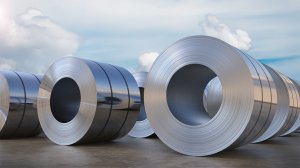Cross-commodity price reporting agency Fastmarkets has launched a new suite of sustainable ‘green steel’ prices.
Green steel, also known as sustainable steel, refers to steel that is produced using environment-friendly and energy-efficient processes, with the goal of minimising carbon dioxide (CO2) emissions, as opposed to traditional steel production methods which involve blast furnaces, which are highly carbon-intensive and contribute significantly to global greenhouse-gas emissions.
Fastmarkets global steel and ferroalloys editor Andrew Wells elaborates: “Our new green steel benchmarks will assess the price differential against traditional flat steel pricing, creating transparency for the industry and supporting investment decisions needed to reduce emissions.”
He notes that these prices are a world first and serve an important need – demand for sustainable steel.
The European Union’s (EU’s) emissions trading system (ETS) is driving decarbonisation in Europe’s steel industry, as well as growing demand among downstream sectors, including the automotive industry, adds Wells.
Steelmaking accounts for 7% to 9% of global CO2 emissions, the majority being produced by coal-based blast furnaces emitting 2 t or more of CO2 for each tonne of steel produced, he says.
“Many steelmakers have announced large investments to replace their bast furnaces with scrap-based electric-arc furnaces and a shift to hydrogen-reduced iron plants,” notes Wells.
In addition, Fastmarkets’ green steel, domestic flat-rolled differential ex works Northern Europe will be assessed weekly against the established Fastmarkets Northern European hot rolled coil (HRC) index, says Wells.
He states that a daily inferred green steel base price will also be calculated based on the Fastmarkets HRC index and the green steel differential to provide real-time transparency.
“Green steel prices will capture the differential between traditional flat-rolled steel prices and prices for steel produced with emissions, including Scopes 1, 2 and 3, of maximum 1 t CO2 per tonne of steel.”
He highlights that all production methods and raw materials will be considered, including scrap-based production and steel made from hydrogen-reduced iron.
Fastmarkets has, simultaneously, continued to develop its price series for high-grade iron-ore, metallics and ferrous scrap, he notes.
“Following extensive research and discussions across the industry, we are well-placed to bring clarity and transparency to a market that is fast becoming a priority area for all steel industry players committed to the energy transition. Steel made with significantly reduced CO2 emissions is widely expected to account for 30% of the European market by 2030.”
Fastmarkets CEO Raju Daswani reiterates that the transition to green steel production is a significant step towards achieving carbon neutrality and addressing climate change.
He explains: “It aligns with global efforts to reduce greenhouse-gas emissions and build a more sustainable and low-carbon economy. We are excited to work with the industry on its decarbonisation journey and help define, measure and communicate green standards and prices to support this transition.”
Edited by: Nadine James
Features Deputy Editor
EMAIL THIS ARTICLE SAVE THIS ARTICLE
ARTICLE ENQUIRY
To subscribe email subscriptions@creamermedia.co.za or click here
To advertise email advertising@creamermedia.co.za or click here













